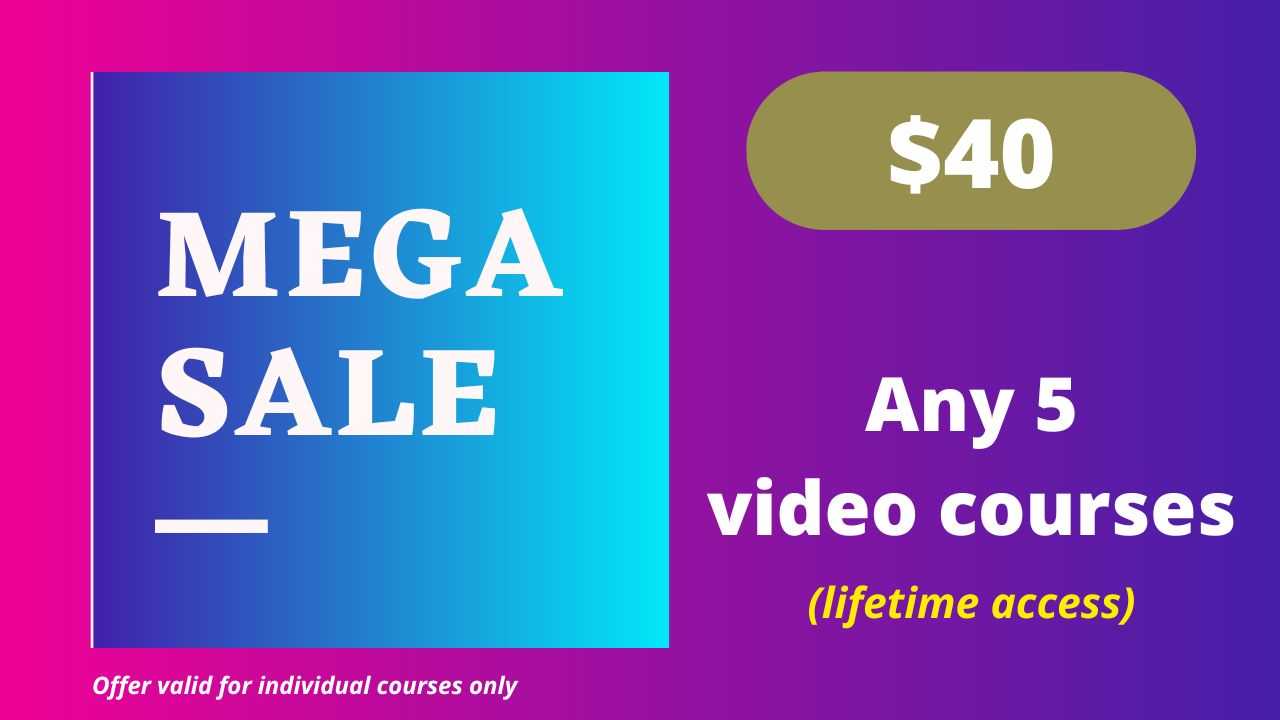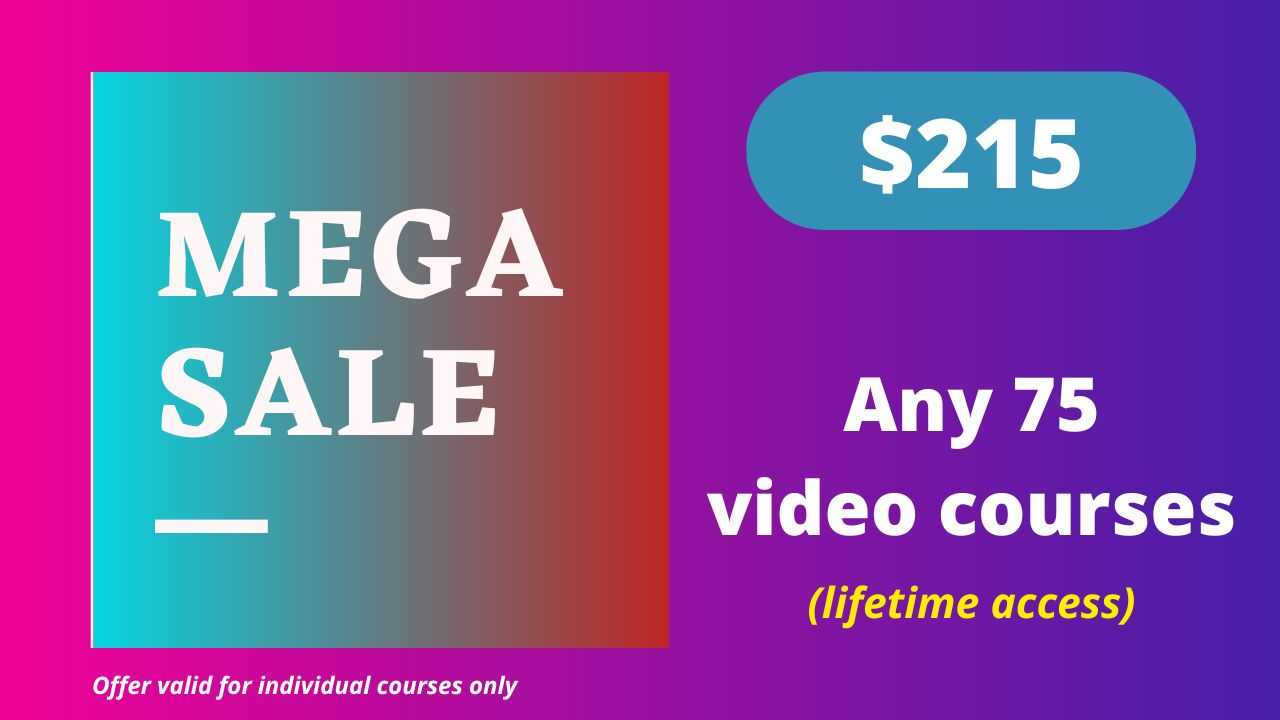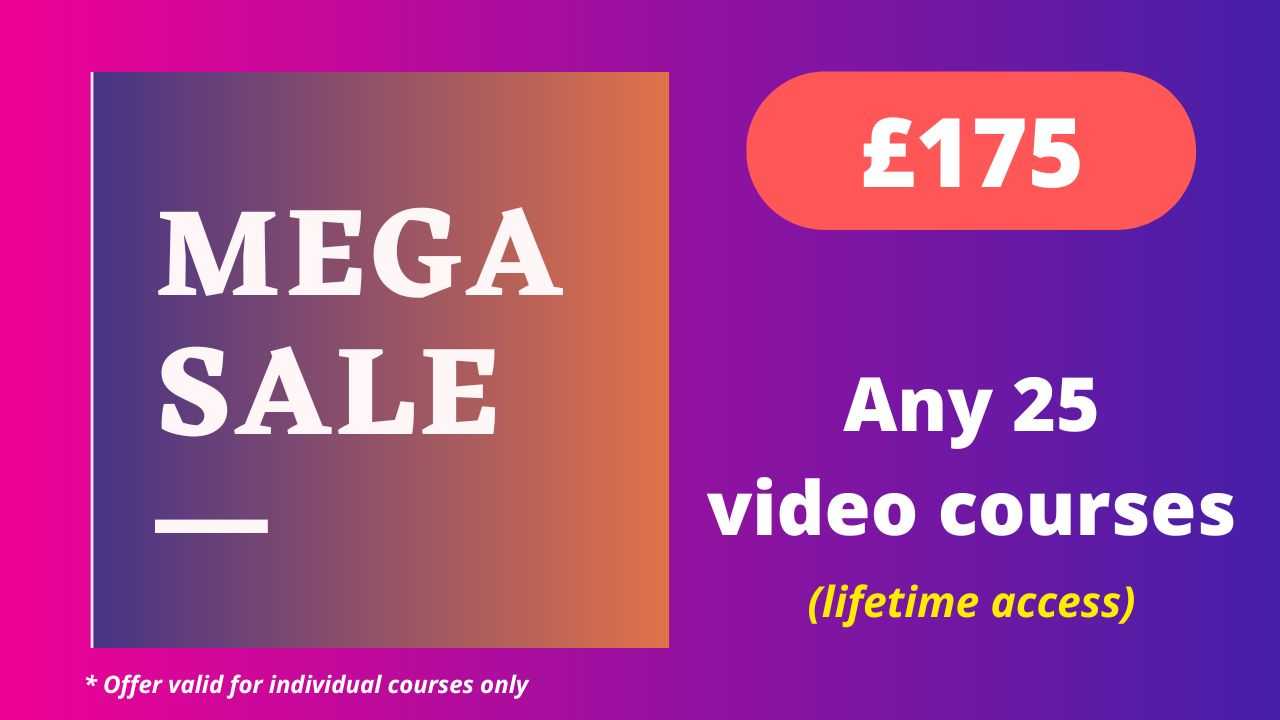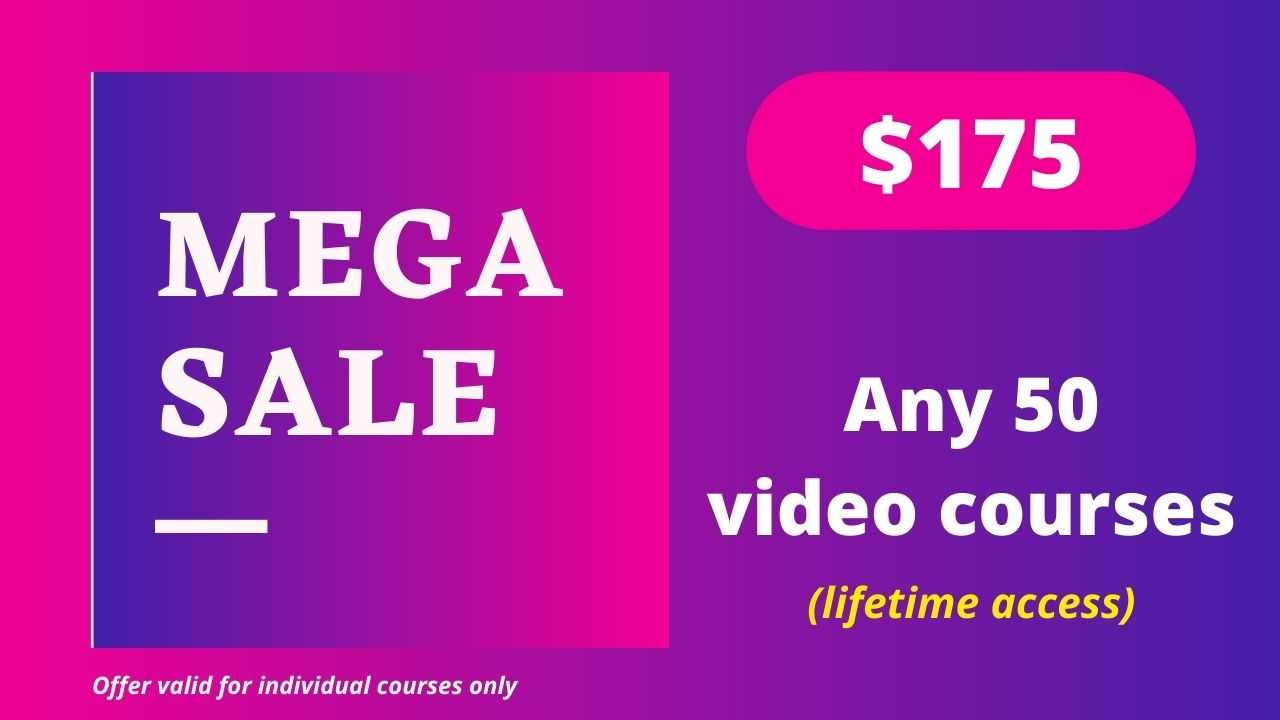Mega Sale 5 - Any 5 Video Courses with Lifetime Access
This is massive sale offer to help you enroll in any 5 courses of your choice on data, cloud, technology, ERP software, project & product management. Price Match Guarantee
Full Lifetime Access
Access on any Device
Technical Support
Secure Checkout
Course Completion Certificate
Price Match Guarantee
Full Lifetime Access
Access on any Device
Technical Support
Secure Checkout
Course Completion Certificate
 90% Started a new career
BUY THIS COURSE (
90% Started a new career
BUY THIS COURSE (USD 63 USD 203 )-
 92% Got a pay increase and promotion
92% Got a pay increase and promotion
Students also bought -
-

- Mega Sale 75 - Any 75 Video Courses with Lifetime Access
- 1500 Hours
- USD 630
- 721 Learners
-

- Mega Sale 25 - Any 25 Video Courses with Lifetime Access
- 500 Hours
- USD 245
- 1212 Learners
-

- Mega Sale 50 - Any 50 Video Courses with Lifetime Access
- 1000 Hours
- USD 420
- 1786 Learners

Uplatz launches this Mega Sale offer of 5 video courses.
You can now simply select any 5 video courses of your choice.
Access will be provided on all 5 courses for lifetime access.
Once you have selected the courses that you want, you have the flexibility to swap any course within 1 month of the purchase if you wish to.
After you have purchased this mega sale course, kindly fill up the below Google Form to let us know your choice of the courses. Uplatz team will provide you the relevant access within 24 hours.
| Google Form for your courses selection |
Note - All individual video courses are permitted under this offer. Since bundle courses and career path courses are combo of a number of courses, hence if you select a bundle or a career path course then the number of individual courses under that bundle / career path will be counted towards the total.
Some of the key technology areas covered are:
· Automotive Engineering
· BI Tools - Tableau, Power BI, SAS BI, etc.
· Cloud Platforms - Microsoft Azure, AWS, Google Cloud Platform
· Cyber Security - CISSP Certification
· Data Analytics - Google Analytics, MS Excel, Google Sheets
· Data Engineering
· Data Science
· Data Visualization with Python, R
· Digital Marketing
· DevOps Engineering
· Embedded Engineering
· Full Stack Web Development (React, Angular, Node.js, MongoDB)
· Machine Learning & Deep Learning
· MATLAB Programming
· Microsoft Technologies
· Oracle (DBA, PL/SQL, BI Publisher, Forms, APEX, WebLogic, ICS)
· Programming - Java, JSP, Java Servlets, Python, R
· Project Management - Fundamentals, Microsoft Project
· Python & R
· Salesforce
· SAP (100 prominent functional and technical modules such as HCM, FICO, MM, PP, PM, QM, SD, S/4HANA TRM, EWM, Ariba, Hybris, GRC, BW/4HANA, S/4HANA Logistics, BW, BusinessObjects BI, Data Services, HANA, ABAP, SuccessFactors, CPI, MDG, and many more)
· SAS
· SEO (Search Engine Optimization)
· ServiceNow
· Shell Programming
· Software Testing
· SQL Programming
· Unix & Linux
· Web Design - HTML5 & CSS3
Other key areas on which we have brilliant courses available:
· Accounting & Finance
· Leadership & Management
· Product Management
Course/Topic - Mega Sale 5 - Any 5 Video Courses with Lifetime Access - all courses
-
Buy this mega sale offer course and then select any 5/10/25/50/75/100 video courses of your choice.
Please email to info@uplatz.com mentioning your choice.
We will then provide you access to these video courses.
Course objectives for a technology course can vary depending on the specific focus, but here are some general objectives that are often included:
1) Understanding Fundamental Concepts: Students will grasp basic technological principles, including hardware, software, networks, and systems.
2) Developing Technical Skills: Students will acquire practical skills in using various tools and technologies relevant to the course topic (e.g., programming languages, software applications, or data analysis tools).
3) Problem-Solving and Critical Thinking: Students will learn to analyze problems, design solutions, and implement effective technological strategies.
4) Applying Theoretical Knowledge: Students will apply theoretical concepts to real-world scenarios, bridging the gap between theory and practice.
5) Collaboration and Communication: Students will develop teamwork and communication skills by collaborating on projects and presenting their work.
6) Ethical and Responsible Use of Technology: Students will understand the ethical implications of technology and learn to use it responsibly.
7)Staying Current with Trends: Students will explore emerging technologies and trends, preparing them to adapt to the evolving tech landscape.
8) Project Management: Students will learn basic project management skills, including planning, executing, and evaluating technology projects.
9) Lifelong Learning: Students will cultivate a mindset of continuous learning to keep pace with rapid technological changes.
10) Interdisciplinary Applications: Students will explore how technology intersects with other fields, enhancing their ability to apply tech solutions across various disciplines.
These objectives can be tailored based on the specific technology area, such as information technology, computer science, data science, or engineering.
A general syllabus for a technology course can vary widely based on the specific focus of the course (e.g., computer science, information technology, data science, etc.), but here’s a typical structure with common topics that might be included:
Course Syllabus Overview
Course Description: This course provides an overview of key technological concepts, tools, and applications in various fields. Students will gain hands-on experience and develop skills in problem-solving, collaboration, and ethical technology use.
Weekly Topics
Week 1: Introduction to Technology
a) Overview of technology in society
b) Historical developments in technology
Week 2: Hardware Fundamentals
a) Understanding computer components
b) Overview of peripherals and devices
Week 3: Software Basics
a)Types of software (system vs. application)
b)Introduction to operating systems
Week 4: Networking Concepts
a) Basics of networking and the internet
b) Understanding protocols and communication
Week 5: Programming Fundamentals
a) Introduction to programming languages (e.g., Python, Java)
b) Writing simple programs
Week 6: Data Management
a) Introduction to databases
b) Basics of data storage and retrieval
Week 7: Web Technologies
a) Understanding HTML, CSS, and JavaScript
b) Basics of web development
Week 8: Cybersecurity Principles
a) Importance of cybersecurity
b) Common threats and protection measures
Week 9: Emerging Technologies
a) Overview of AI, machine learning, IoT, and blockchain
b) Discussion of trends and future implications
Week 10: Ethical Considerations in Technology
a) Understanding ethical issues (privacy, security, etc.)
b) Responsible technology use
Week 11: Collaboration and Project Management
a) Tools for collaboration (e.g., Google Workspace, Trello)
b) Basics of project management methodologies
Week 12: Capstone Project and Presentations
a) Group projects showcasing learned skills
b) Final presentations and peer reviews
Course Requirements
Textbook/Readings: [List of required texts or resources]
Assignments: Weekly readings, quizzes, and hands-on projects
Exams: Midterm and final assessments
Projects: Group project focusing on a real-world problem
We provide 5 video courses with Certification ensuring you know planning, production and measurement techniques needed to stand out from the competition.
Data Science is defined as the art of interpreting data and getting useful information out of it whereas Data Visualization involves the representation of the data, basically, both of them cannot be considered as two completely different entities, as they are bound together in a way that Data Visualizations is then
If you're passionate about the statistical calculation and data visualization portions of data analysis, R could be a good fit for you. If, on the other hand, you're interested in becoming a data scientist and working with big data, artificial intelligence, and deep learning algorithms, Python would be the better fit.
This Data Science with Python program provides learners with a complete understanding of data analytics tools & techniques. Getting started with Python can help you gain knowledge on data analysis, visualization, NumPy, SciPy, web scraping, and natural language processing.
Uplatz online training guarantees the participants to successfully go through the Data Science and Data Visualization Platform Certification provided by Uplatz. Uplatz provides appropriate teaching and expertise training to equip the participants for implementing the learnt concepts in an organization.
Course Completion Certificate will be awarded by Uplatz upon successful completion of the Data Science and Data Visualization Platform online course.
The Data Science and Data Visualization Platform draws an average salary of $120,000 per year depending on their knowledge and hands-on experience.
R in data science is used to handle, store and analyze data. It can be used for data analysis and statistical modeling. R is an environment for statistical analysis. R has various statistical and graphical capabilities.
A data analyst uses static modeling techniques that summarize the data through descriptive analysis. On the other hand, a data engineer is responsible for the development and maintenance of data pipelines. A data scientist uses dynamic techniques like Machine Learning to gain insights about the future.
Overall, becoming a data engineer is a great career choice for people who love detail, following engineering guidelines, and building pipelines that allow raw data to be turned into actionable insights. As mentioned earlier, a career in data engineering also offers excellent earning potential and strong job security.
Note that salaries are generally higher at large companies rather than small ones. Your salary will also differ based on the market you work in.
Data Engineer.
Data Science Manager.
Data Analyst.
Data Science Consultant.
Here are some general interview questions along with example answers tailored for technical courses. These can be adjusted based on specific subjects or technologies.
Q1. Tell me about yourself.
Answer:
I have a background in [your field, e.g., computer science], with a focus on [specific area, e.g., software development]. I graduated from [university] where I worked on projects involving [mention relevant projects or technologies]. Recently, I completed a [relevant certification or course], which enhanced my skills in [specific skills]. I’m passionate about [related interest, e.g., solving complex problems or building applications], and I’m excited to apply my knowledge in a practical environment.
Q2. What is your favorite programming language, and why?
Answer:
My favorite programming language is Python because of its simplicity and versatility. It has a clear syntax that makes it easy to learn, and its extensive libraries and frameworks, like Django for web development and Pandas for data analysis, allow for rapid development. I've used it in projects ranging from data analysis to building web applications, which has reinforced my preference.
Q3. Can you explain the concept of object-oriented programming?
Answer:
Object-oriented programming (OOP) is a programming paradigm that uses 'objects' to represent data and methods. The four main principles of OOP are encapsulation, abstraction, inheritance, and polymorphism. For example, in a program for a library system, a 'Book' class could encapsulate properties like title and author, while methods like checkout and return would define behaviors associated with a book. This structure promotes code reuse and makes programs easier to manage and understand.
Q4. Describe a challenging technical problem you faced and how you solved it.
Answer:
In a recent project, I encountered a performance issue where the application was running slowly under high load. After profiling the application, I identified a bottleneck in the database queries. I optimized these queries by adding indexes and restructuring them to reduce execution time. Additionally, I implemented caching for frequently accessed data. As a result, we improved the application’s response time by over 50%, which significantly enhanced user experience.
Q5. How do you stay updated with the latest technology trends?
Answer:
I stay updated through a combination of methods: I follow reputable tech blogs and websites like TechCrunch and Stack Overflow, participate in online courses on platforms like Coursera, and attend webinars and conferences whenever possible. I also engage with developer communities on platforms like GitHub and LinkedIn, where I can share knowledge and learn from others.
Q6. What is your experience with version control systems?
Answer:
I have extensive experience using Git for version control. I utilize Git for managing code changes, collaborating with teams, and maintaining project history. I am familiar with branching strategies like Git Flow, and I regularly use commands for merging and rebasing. In my last project, I led a team in adopting Git, which improved our workflow and minimized conflicts.
Q7. Can you explain the differences between SQL and NoSQL databases?
Answer:
SQL databases are relational databases that use structured query language and are designed for structured data with predefined schemas. They excel in complex queries and transactions. In contrast, NoSQL databases are non-relational and can handle unstructured or semi-structured data. They offer flexibility in schema design and scalability, making them ideal for applications with rapidly changing data requirements. An example of SQL is MySQL, while MongoDB is a popular NoSQL database.
Q8. What is your approach to debugging code?
Answer:
My approach to debugging starts with reproducing the issue to understand the context. I then analyze the relevant code, using tools like debuggers or console logs to track the flow of execution and variable states. I also break down complex problems into smaller parts to isolate the cause. If I’m stuck, I consult documentation or online resources and collaborate with peers for fresh perspectives. After resolving the issue, I ensure to write tests to prevent future occurrences.
Q9. How do you prioritize tasks in a project?
Answer:
I prioritize tasks based on urgency and impact. I use a combination of project management tools and methodologies like Agile to assess the importance of each task. I also consider dependencies and communicate with my team to align on priorities. Regular check-ins help us adjust our focus as needed, ensuring we meet deadlines without compromising quality.
Q10. Why do you want to work in this field?
Answer:
I’m passionate about technology and its potential to solve real-world problems. The field is constantly evolving, which excites me as it offers endless opportunities for learning and growth. I want to contribute to projects that have a meaningful impact, and I believe that [Company Name] is at the forefront of innovation, making it the ideal place for me to apply my skills and grow as a professional.









